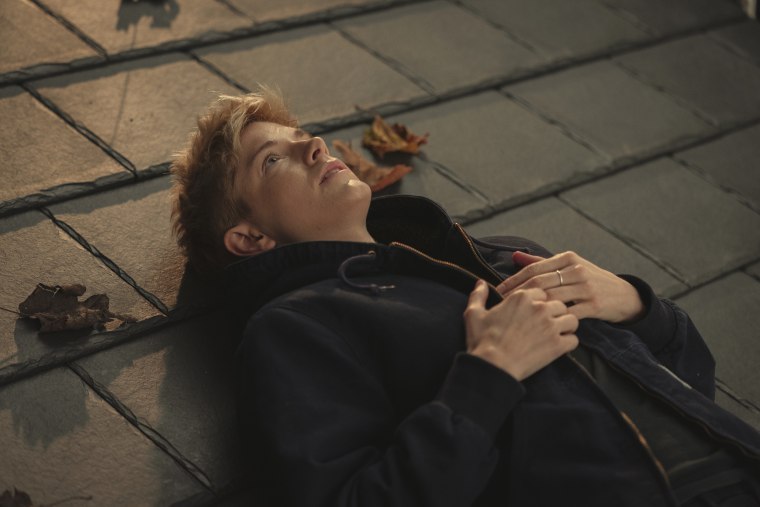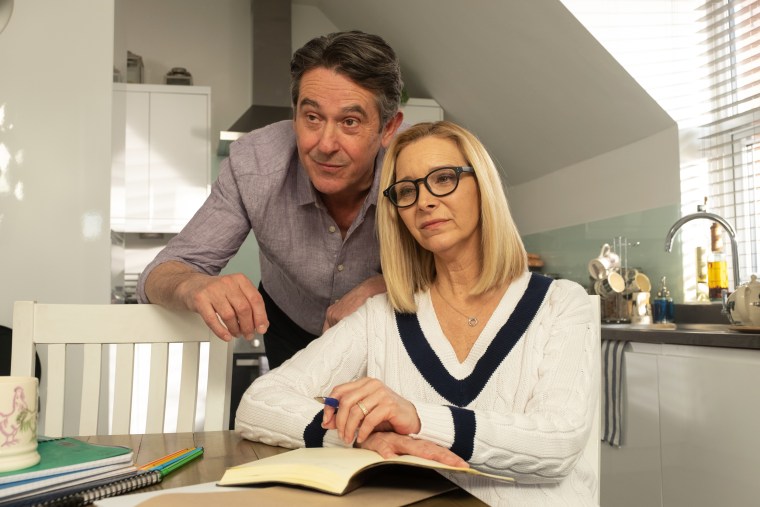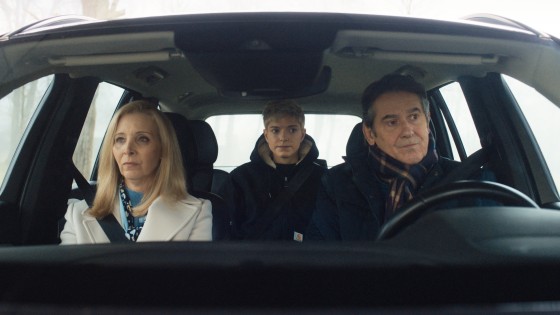When co-creators Mae Martin and Joe Hampson set out to cast the sardonic mother in their hit comedy-drama series “Feel Good,” they knew they wanted someone with “the gravitas of Lisa Kudrow.” But they never expected the “Friends” star to read their scripts, let alone agree to join the cast in the United Kingdom with a resounding yes.
Set in Manchester, England, the semi-autobiographical series, which is largely based on Martin’s own experiences, follows a stand-up comedian (also named Mae) recovering from addiction who struggles to control the addictive behaviors and intense romanticism that permeate every facet of their life. Kudrow plays Mae’s mother, Linda, and English actress Charlotte Ritchie plays Mae’s girlfriend, George, who has hitherto thought of herself as straight and discovers dark secrets about Mae’s troubled past that threaten to unravel their tumultuous relationship.
“I was sent all the scripts for season one that Mae and Joe wrote, and it was undeniably fantastic, right up my alley,” Kudrow told NBC News in a joint video interview with Martin, who uses she/her and they/them pronouns. “I’ll figure out who Linda is later, but [I was like], ‘Just say yes, because it’s so honest.’ And then I did a little dive into Mae Martin — all the stand-up I could see, interviews — and she’s fantastic. She’s so open, funny, accepting, really smart and accessible. It was an absolute yes.”

When they first set out to create a show together, Martin and Hampson, who had met at a comedy festival in 2012, tried to pitch “all kinds of crazy shows” to various networks — mostly murder mysteries and science-fiction series — to no avail.
But in 2017, Martin, believing the nature of addictive behavior would resonate with audiences across the country, did a critically acclaimed stand-up tour called “Dope,” which focused on the intersection of love and addiction. Martin was ultimately approached by Channel 4, a British public service broadcast network, to turn their life story into a scripted comedy-drama series. (The first season premiered in March 2020 on Channel 4 in Britain and on Netflix globally, while the second premiered earlier this month exclusively on Netflix.)
“I think it was a natural choice that it would be a love story,” Martin said, “because I’m deeply romantic, and I was fresh out of a big breakup, so it kind of flowed out of me like lava.”
After signing on to the project, Kudrow emailed Martin a few questions that helped Kudrow get a better grasp of her character — “a woman who uses her erudition to keep people at a distance because that’s safer” — before flying to the U.K. to begin production. Martin, who described sending the first six scripts to the “Friends” alum as “a shot in the dark,” said they and Hampson were already longtime admirers of Kudrow's work and could barely contain their excitement.
“I remember meeting Lisa in her hotel, maybe the day before we were filming or two days before. I thought I was being pretty cool and pretty chill, but I was holding a pen, and halfway through talking, the pen just snapped in my hand and exploded. And I was like, ‘I guess I’m putting all of my tension into this pen,’” Martin said with a laugh.

Martin wasn’t the only person shaky about working with the iconic TV actress.
“Everyone was like, ‘Oh, we’re so nervous for Lisa to be here,’ and I was like, ‘Well, it’s pretty scary for Lisa to fly to another country. She doesn’t know any of these people,’” Martin added. “I think people get so wrapped up in their own kind of excitement about meeting [her] that they forget that this is a new environment [for her].”
While much of the first season centered on Mae’s faltering commitment to their sobriety, George’s gradual coming-out journey and their increasingly complicated love story, the second and final season picks up in the aftermath of the couple’s ambiguous breakup and tackles equally heavy subject matter, including gender identity, sexual violence and post-traumatic stress disorder.
Martin, who has infused many of their own experiences and even their own name into the show, said they felt it was important to show the humanity of the characters who go through these difficult issues — and that meant embracing the ambiguity life has to offer instead of shying away from it.
“These topics, like sexual assault or gender identity, get co-opted by these really polarizing political forces, and they become these really fraught public conversations, and I think we sometimes forget the human aspect of these things and the nuance and how complicated they are,” said Martin, who came out as nonbinary in April. “Maybe because these conversations are so fraught, there’s pressure to be so definitive in what you’re saying, and real life is so much more complicated than that.”
“I think as long as you’re being really honest about your personal experience, you can’t really be wrong, because that’s your experience, and you just hope that other people feel similarly and equally confused about those things and those experiences,” they added. “The human experience is not as varied as we’d like to think. We’re pretty much struggling in the same ways, I think, and respond to things similarly.”
For Kudrow, the show’s ability to “not editorialize,” in addition to its honest and uninhibited depictions of love between two people, remains one of its greatest strengths.
“Mae loves George, however George ultimately identifies. And George loves Mae, however and wherever Mae ultimately lands. It doesn’t matter because that’s who George loves,” she said. “There’s no stance or stand [taken] other than this is what it is to feel these things, to do these things, to be unsure about this, not be sure how to deal with that. I think we need a lot more of that.”
While the fluidity of sexuality and gender identity is certainly a subject of conversation in the 12 half-hour episodes spread over two seasons, Martin and Hampson have chosen to address those topics in a candid but surprisingly gentle and subtle way. For instance, the fictional Mae eventually comes to a similar realization about their gender identity as their real-life counterpart, but it is accepted without a second thought and does not become a focal point of the sophomore season.
“I’ve seen so many stories about homophobia, and so when that’s the focus of the story, I think often the characters have to be kind of heroic or victimized,” noted Martin, who earned a BAFTA nomination for acting in the series. “I think I’m glad these characters are able to be really flawed, and the focus isn’t the society’s homophobia — which very much still exists — but in their lives. It’s much more about who they are and all the different aspects of their personalities.”
While there is certainly a lot of work left to be done to normalize this kind of representation — where, Martin said, “there is no pressure for Mae and George to label themselves in any way” in their relationship — both Martin and Kudrow noted the market for diverse storytelling has and will only continue to get bigger.
“I was just thinking that this show reminded me of an independent film that I maybe would have done in the ’90s, and now it’s not an independent film,” Kudrow said, smiling. “Now it’s completely available on anybody’s TV set if they have Netflix, so that’s a big, big deal.”
For Martin, who considers this project “a childhood dream come true,” there is just one thing they hope viewers take away from the series, which also underscores their romantic nature: “As people watch it, I hope their allegiance shifts between Mae and George and that relationship and that they can relate to both of them in any given episode,” they said. “I just hope people relate to their love story.”
“Feel Good” is now streaming on Netflix.
